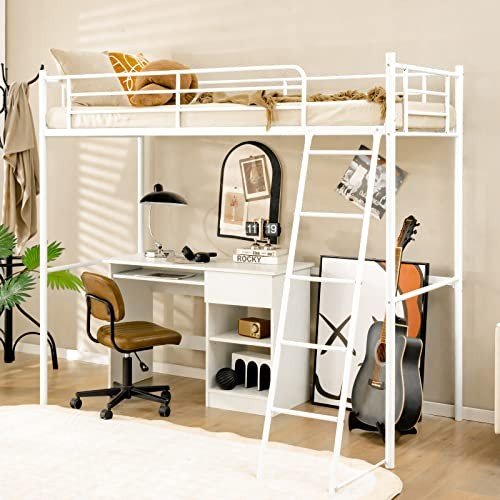20 Myths About Bunk Beds: Busted
Exploring Bunk Beds: A Comprehensive Guide
Bunk beds have long been a staple in children's bedrooms, dormitories, and even homes with restricted space. Not just do they offer a practical sleeping service, however they also create a fun and imaginative environment for children and a great space-saver for adults and households. This article will explore everything you need to understand about bunk beds, from types and products to security tips and buying recommendations.
Tabulation
- Kinds Of Bunk Beds
- Standard Bunk Beds
- Loft Beds
- Triple Bunk Beds
- L-Shaped Bunk Beds
- Material Options
- Wood
- Metal
- Safety Considerations
- Purchasing Guide
- FAQs
Kinds Of Bunk Beds
Bunk beds are available in numerous designs to suit various needs and choices. Here's a breakdown of the most typical types:
Conventional Bunk Beds
Traditional bunks generally include two beds stacked vertically on top of one another. These beds are perfect for siblings sharing a space or for maximizing sleeping space in guest rooms.
Loft Beds
Loft beds stand likewise to conventional bunk beds however do not have a lower sleeping location. Instead, they typically integrate a desk or seating location beneath, making them a great option for little spaces needing multifunctionality.
Triple Bunk Beds
Triple bunk beds are created for 3 residents, with beds stacked in a three-tier configuration. These are less common but can be an enjoyable service for large households or slumber parties.
L-Shaped Bunk Beds
With one bed positioned horizontally and the other vertically, L-shaped bunk beds are typically equipped with additional features such as desks or storage drawers and can complement corner spaces in a space.
Comparison of Bunk Bed Types
Bed Type
Ideal Use
Description
Traditional
Shared bed rooms or guest spaces
Two beds stacked vertically
Loft
Little spaces requiring multi-purpose space
Upper bed with open space beneath
Triple
Big families or sleepovers
Three beds stacked vertically
L-Shaped
Corner or versatile spaces
A mix of vertical and horizontal beds
Material Options
Bunk beds are manufactured from numerous products, with wood and metal being the most common. Each product has its advantages and disadvantages.
Wood
- Resilience: Generally robust and can withstand years of usage.
- Aesthetic Appeal: Offers a classic look that can blend with different decorations.
- Weight Capacity: Typically stronger; can support heavier weights.
- Drawbacks: May be more expensive than metal alternatives and can be prone to scratches.
Metal
- Sturdiness: Generally light-weight and simple to move however still durable.
- Modern Design: Often is available in streamlined styles, making it appealing for modern spaces.
- Affordable: Usually less costly than wood options.
- Disadvantages: Can be cold to the touch in winter seasons and may not have the same visual appeal for some buyers.
Safety Considerations
When it concerns bunk beds, safety can not be neglected. Here are crucial safety ideas to remember:
- Guardrails: Ensure that the top bunk has guardrails on both sides to prevent falls.
- Tough Construction: Check for a solid develop and strong materials to endure weight and motion.
- Weight Limit: Adhere to the producer's weight limitation for both the upper and lower bunks.
- Ladder Design: Choose bunks with a safe, easy-to-climb ladder and prevent any sharp edges or rungs.
- Age Restrictions: Most makers recommend that children under the age of six need to not sleep in the upper bunk.
Purchasing Guide
When shopping for bunk beds, consider the list below aspects to discover the very best fit for your needs:
- Space Availability: Measure the space size and ceiling height, ensuring there is adequate space for the leading bunk.
- Bed Size: Decide between twin, full, or bigger sizes based on your requirements and the size of the room.
- Style Preference: Consider the total design of the bedroom to discover an appropriate design.
- Alleviate of Setup: Look for a bunk bed that is uncomplicated to assemble.
- Budget: Bunk beds are available in numerous price ranges, so figure out a spending plan before starting your search.
FAQs
1. What is the suggested age for children to sleep on the top bunk?
Children aged six and older are normally recommended to sleep on the leading bunk to reduce the risk of falls.
2. How can I make my bunk bed much safer?
To improve safety, make sure guardrails are appropriately installed and examine that the bed is put on a flat surface. Additionally, encourage kids to use the ladder thoroughly.
3. Can I transform a bunk bed into two separate beds?
Lots of bunk beds are developed to be convertible. Inspect the manufacturer's requirements for convertibility features.
4. What accessories are available for bunk beds?
Common accessories consist of beddings, storage drawers, staircases instead of ladders, and tented canopies for a fun visual appeal.
5. How do I preserve my bunk bed?
Routine checks for loose screws or structural stability can help ensure security. Dust the bed regularly and clean spills promptly to keep the products in good condition.
Bunk beds are versatile and a space-efficient option for numerous living circumstances, from kids's spaces to guest lodgings. With look at more info and products available, potential buyers have a wealth of alternatives to think about, ensuring a combination of functionality and visual appeals. By prioritizing safety and following the tips laid out in this guide, people can find the right bunk bed that matches their space and way of life, all while developing an enjoyable sleeping environment.
